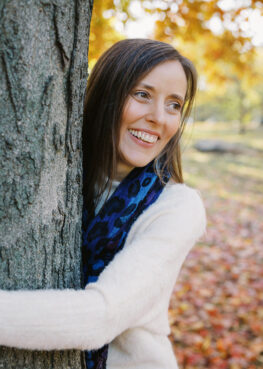
(RNS) — Lea Schweitz has become a fan of and a facilitator for having conversations we all like to avoid.
She remembers that soon after her Stage 4 lung cancer diagnosis two years ago, a caregiver told her she better get her finances together. But between triaging her responsibilities and focusing on healing, she set aside the daunting “get your affairs in order” aspect of her diagnosis, she told RNS.
Then, her 10-year-old’s friend showed up at her Chicago home on Halloween in a Grim Reaper costume.
“The whole thing was hilarious to me,” said Schweitz, a former systematic theology professor. “It was this little snapshot of this long playdate with death that we had gone on.”

Lea Schweitz. (Photo by Kate Kaplan)
Soon after the Grim Reaper visit, Schweitz invited friends to gather and do the end-of-life planning she’d been avoiding. And in February 2024, she started her Substack, “Playdates with Death,” which aims to serve as a place for people from anywhere to come together and do the hard work of preparing for their deaths. The online community meets on Zoom once a month for a “community playdate,” which tackles one of 12 projects for the year, from obituary writing, to creating phone trees for emergencies, to funeral planning, to a Q&A session with an estate attorney. Schweitz has started hosting workshops on related topics at churches.
Americans are starting to talk about death in new ways. The new FX on Hulu show “Dying for Sex,” starring Michelle Williams, is about dying of cancer, and has become a hit. The growing death-tech industry hopes to streamline end-of-life planning. Death Over Dinner is a project that encourages people to discuss death at their next dinner party. And in February, The New York Times’ Tech Tip focused on digital estate planning.
Meanwhile, the International End of Life Doula Association’s membership rose from about 1,700 in 2023 to 2,296 last year. The death awareness movement of the 1970s and 1980s seems to have to morphed into the death positive movement today, which encourages people to talk about and learn to accept the reality of death, dying and burial — topics that often make people anxious or scared.
Schweitz earned her Ph.D. in religion at the University of Chicago. Throughout her career, she’s long been asking deep, hard questions, whether about climate change, dementia or technology.
Then, two years ago, at age 48, while navigating a job loss and divorce, the mom of two received her diagnosis.
“There’s a need to find playful ways to do this hard work in community,” Schweitz said. “Professional training helped me hold this space with people’s biggest concerns. As hard as it is, it is also life-giving and glorious.”
While “Playdates with Death” isn’t explicitly religious, Schweitz said many of the practices are theologically and spiritually informed, whether she’s leading a gratitude practice or an embodied movement session.
Kathleen Garces-Foley, professor of religious studies at Marymount University in Arlington, Virginia, has written extensively about hospice and efforts to improve end-of-life care by bringing “spiritual presence” to those who are dying. While there is no specified survey to ask people if they are interested in end-of-life information and care, she said that once you add up those seeking “death cafes, death doulas and death memoirs, you do get a picture of interest.”
“Using death as a spiritual opportunity for growth was a popular theme in the 20th century,” she said. “But the growing financial burden of end-of-life care is a big concern.”
For Schweitz’s workshop series at St. Paul & St. Andrew United Methodist Church in Manhattan, 75 people signed up.
“Doesn’t that tell you how hungry people are for information like this?” said participant Leah Heimbach. “There were young, old, some in other states.”
The four-part series that started in January covers subjects such as “Finding your why and the big 3 of end-of-life planning” and “End-of-life celebrations.” Schweitz intends to bring the workshops, which first started with her friends, to different churches around the country.
Among the participants was Courtney Behm, 45, who moved to Manhattan from Ohio four years ago and had been intending to update her life planning paperwork, she said. When she saw the workshops advertised, she said it gave her the nudge she needed.

A variety of posts on Lea Schweitz’s “Playdates with Death” Substack. (Screen grab)
Behm works in construction management, but her family runs a fourth-generation funeral business. She’s always known taking care of these types of things while you are still around can be a huge support for your family, but she hadn’t yet gone into the details that “Playdates with Death” offered.
“Lea makes complex things relatable,” Behm said. For example, when Schweitz said on her Substack that an obituary writing lesson would be part of one of the church sessions, Behm decided to attend. “It’s a powerful experience to write an obituary,” she reflected. “It helped me get grounded before I dove into the work.”
Whether Schweitz is leading in-person workshops or online community playdates, her goal is to “turn the volume down” on participants’ nervous systems when considering these tough topics, she said. She opens with a lighthearted check-in question and gentle movement, like chair yoga, before moving into the day’s task. She ends every “playdate” with a dance session, hoping everyone will leave feeling better than when they came in, even after doing the hard work of preparing for death.
Heimbach, 64, has a health care background and was intrigued when she heard about the workshops, she said. At a “celebration of life” session, her view on funerals expanded as Pastor Andrea Steinkamp told stories about various funerals at St. Paul & St. Andrew. For one member who loved gardening, her memorial service was held outside at the church.
“My husband doesn’t make a big deal about what he’s done, but I intend to have a celebration for him,” Heimbach said. “That’s what I learned in the celebration of life session. Sometimes, it isn’t for you — it’s helping the people left behind.”
Schweitz considers herself adjacent to end-of-life caretakers like death doulas and hospice workers but is clear that’s not the work she is doing. She sees herself as a community builder around end-of-life planning to empower families to take care of necessary tasks before things are dire, she said.
“It’s not necessarily folks who have gotten a diagnosis recently,” she said of her participants. “You have to want to be in this space — if things are imminent, it’s harder to have that cheeky playfulness.”
She said the group is for people of all ages, and the hope is participants can stay relaxed and playful when having hard conversations because they practiced once a month through the workshops.
Earlier this month, Behm submitted her life planning paperwork to an attorney.
“It’s a lot of work,” she said. “But you can see how much it can help others.”
